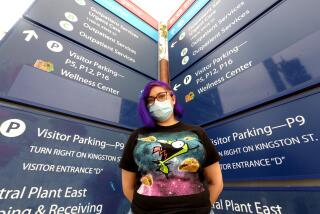Shelter for Addicted Mentally Ill to Close Next Month
Friend to Friend, the only transitional housing program in San Diego devoted solely to mentally ill homeless adults with drug and alcohol dependencies, will close next month due to lack of funding, a director said Wednesday.
The 14-bed residence for men and women, started on a shoestring budget a year ago, is about $20,000 in the red and has relied on its sponsor, Episcopal Community Services, to stay alive the past couple of months, said Ann King, director of transition programs for ECS.
Most of Friend to Friend’s residents are referrals from San Diego County crisis centers that are able to accommodate them for only a few days. Friend to Friend has provided each of its residents with a bed and a roommate in one of seven rooms rented at the Palm Hotel on 12th Avenue, as well as referrals to narcotic and alcohol rehabilitation programs and vocational counseling, King said.
The residents otherwise depended largely on themselves--planning outings, attending group meetings and making sure each “friend” had food and support through the “bad days,” she said.
Residents were allowed to stay for up to six months. Four people in the program graduated last fall to live on their own, obtain new jobs or enroll in school. Ten more are scheduled to graduate before the shelter closes March 15.
“They don’t graduate to become rocket scientists,” King said. “But if they get to the point that they feel pretty good about themselves, they get off drugs and maybe find a job, they’re doing a damn good job.”
The impending closure puts an additional strain on services in downtown San Diego, where 1,250 beds are available each night for about 3,600 homeless, said Frank Landerville, project director for the Regional Task Force on the Homeless. About a third of the 3,600 homeless downtown suffer from some form of mental illness, he said, most of it related to the homelessness itself.
“The real value of that program’s service to the community is that they were taking people who were dually diagnosed, absolutely the last population that people want to take in or are equipped to deal with,” he said.
A number of county mental health and crisis center workers echoed Landerville’s remarks.
“We’re going to be at a loss, a severe loss, for a place to refer our patients,” said Barry Levin, a coordinating counselor at Isis Center, a short-term in-patient psychiatric facility downtown. “I can’t think of one program that was so necessary, of all the programs that have started up in the past few years, and now it’s being axed. It’s a real shame.”
“There’s not enough residences or shelter programs for homeless persons or homeless mentally ill persons in this county,” said Henry Tarke, a manager for the county’s Mental Health Services, which provided some of Friends’ start-up money but was unable to give permanent funding. (The program’s staff and service costs are about $17,000 a month.) Tarke called the closing “distressing.”
In the meantime, the program is scurrying to find places for its 14 residents so they won’t have to continue their recoveries on the streets, King said.
Bob, 33, has been in the program since December, two months after he suffered a relapse from a mental breakdown and lost 60 pounds over two months from using crystal methamphetamine. Describing himself as “manic depressive with psychotic episodes,” Bob said he was refused by 10 or 12 residences before getting into Friends.
“When you’re on medication, they don’t want anything to do with you,” he said.
Bob said he doesn’t know where he’ll go from here, but intends to spend the next couple of weeks on the phone asking other shelter programs to accept him.
More to Read
Sign up for Essential California
The most important California stories and recommendations in your inbox every morning.
You may occasionally receive promotional content from the Los Angeles Times.









